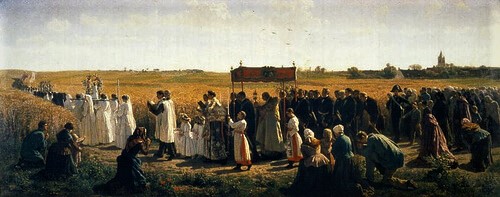The Faithful of the Ordinariate observe the Memorial of The Blessed Virgin Mary, Mother of the Church, on the Saturday after Ascension Day. This Memorial has a precedence higher than any other Memorial, but lower than all Feasts, Solemnities, and privileged Octaves. The General Roman Calendar observes the Memorial on Whitmonday. The move within the Ordinariate to the Saturday after Ascension Day prevents the Memorial from being permanently occluded by the higher ranking day within the Octave of Pentecost.
_____________________________________________________
From Pope St. John Paul II:
Although the title “Mother of the Church” was only recently attributed to Mary, it expresses the Blessed Virgin’s maternal relationship with the Church as shown already in several New Testament texts.
Since the Annunciation, Mary was called, to give her consent to the coming of the messianic kingdom, which would take place with the formation of the Church.
When at Cana Mary asked the Son to exercise his messianic power, she made a fundamental contribution to implanting the faith in the first community of disciples, and she co-operated in initiating God’s kingdom, which has its “seed” and “beginning” in the Church (cf. Lumen gentium, n. 5).
On Calvary, Mary united herself to the sacrifice of her Son and made her own maternal contribution to the work of salvation, which took the form of labour pains, the birth of the new humanity.
In addressing the words “Woman, behold your son” to Mary, the Crucified One proclaims her motherhood not only in relation to the Apostle John but also to every disciple. The Evangelist himself, by saying that Jesus had to die “to gather into one the children of God who are scattered abroad” (Jn 11:52), indicates the Church’s birth as the fruit of the redemptive sacrifice with which Mary is maternally associated.
The Evangelist St Luke mentions the presence of Jesus’ Mother in the first community of Jerusalem (Acts 1:14). In this way he stresses Mary’s maternal role in the newborn Church, comparing it to her role in the Redeemer’s birth. The maternal dimension thus becomes a fundamental element of Mary’s relationship with the new People of the redeemed.
___________________________________________________
GRANT, we beseech thee, O Lord God, that we thy servants may enjoy perpetual health of mind and body: and, at the glorious intercession of the blessed and ever-Virgin Mary, may be delivered from present sadness, and may rejoice in continual gladness; through Jesus Christ thy Son our Lord, who liveth and reigneth with thee, in the unity of the Holy Spirit, ever one God, world without end. Amen.













